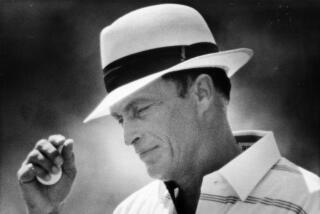Joaquin Rodrigo; Composer Known for Guitar Pieces
- Share via
Joaquin Rodrigo, Spanish composer whose “Concierto de Aranjuez” for guitar and orchestra became one of the 20th century’s best-known pieces of classical music, has died. He was 97.
Rodrigo, who overcame blindness to gain international stature in the classical music world, died Tuesday at his home in Madrid.
His most famous work, written in Paris in 1939, gained a new following two decades later when jazz legend Miles Davis included it in his “Sketches of Spain” recording.
Rodrigo named the piece for the town of Aranjuez, about 30 miles south of Madrid. He was buried there Wednesday next to his wife, Turkish pianist Victoria Kamhi.
After Rodrigo’s death was announced this week, radio stations throughout Spain played the haunting melodies of the “Concierto,” with its romantic overtones of the country’s Moorish past.
“Rodrigo was the most international of our composers,” Miguel Groba, conductor of the Madrid City Orchestra, told Reuters. “His loss is a tremendous blow to the musical world.”
The composer was also known for his “Fantasia Para un Gentilhombre,” another work for guitar and orchestra. Rodrigo wrote scores of classical pieces, but his compositions featuring guitar have remained the most durable.
Encouraged by his early success, he composed concertos for other instruments such as violin and cello but never achieved the same artistic heights as he did with “Aranjuez.”
His “Absences of Dulcinea” for bass, four sopranos and orchestra, however, did earn the National Cervantes Prize.
Born in Sagunto near the Spanish city of Valencia on Nov. 22, 1901, Rodrigo was blinded at the age of 3 when he suffered from diphtheria. He learned to play piano and violin with the help of Braille.
He also studied composing in his youth, and in 1924 the Valencia Orchestra performed his “Juglares.” He went on to study at the Schola Cantorum.
Rodrigo earned Spain’s Conde de Cartagena Grant in 1934, enabling him to study musicology in Paris at its Conservatoire and Sorbonne. He lived in the French capital, and for a time in Germany, until the end of the Spanish Civil War, when he returned to Madrid.
“Concierto de Aranjuez” premiered in Barcelona in 1940 and brought Rodrigo instant acclaim as Spain’s leading postwar composer.
“Few works in recent years have received so enthusiastic an ovation at a first hearing,” a biographer wrote.
The Manuel de Falla Chair was created for Rodrigo at Madrid University. A festival of his music was presented in Buenos Aires in 1949, and a year later he was elected to the San Fernando Fine Arts Academy in Madrid. He also became a popular lecturer and music critic.
He received myriad honors in Spain, France and elsewhere in Europe. In 1982, he was awarded an honorary doctorate from USC.
One daughter, Cecilia, survives.
More to Read
The biggest entertainment stories
Get our big stories about Hollywood, film, television, music, arts, culture and more right in your inbox as soon as they publish.
You may occasionally receive promotional content from the Los Angeles Times.










